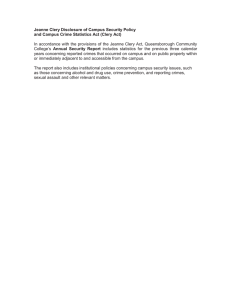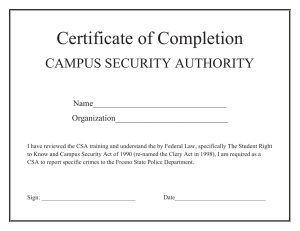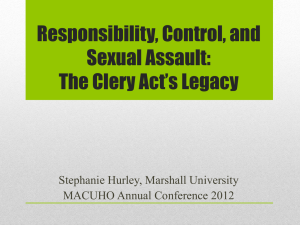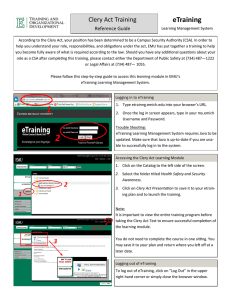August 1, 2014 To: Advisors of Recognized Student Organizations at Penn State
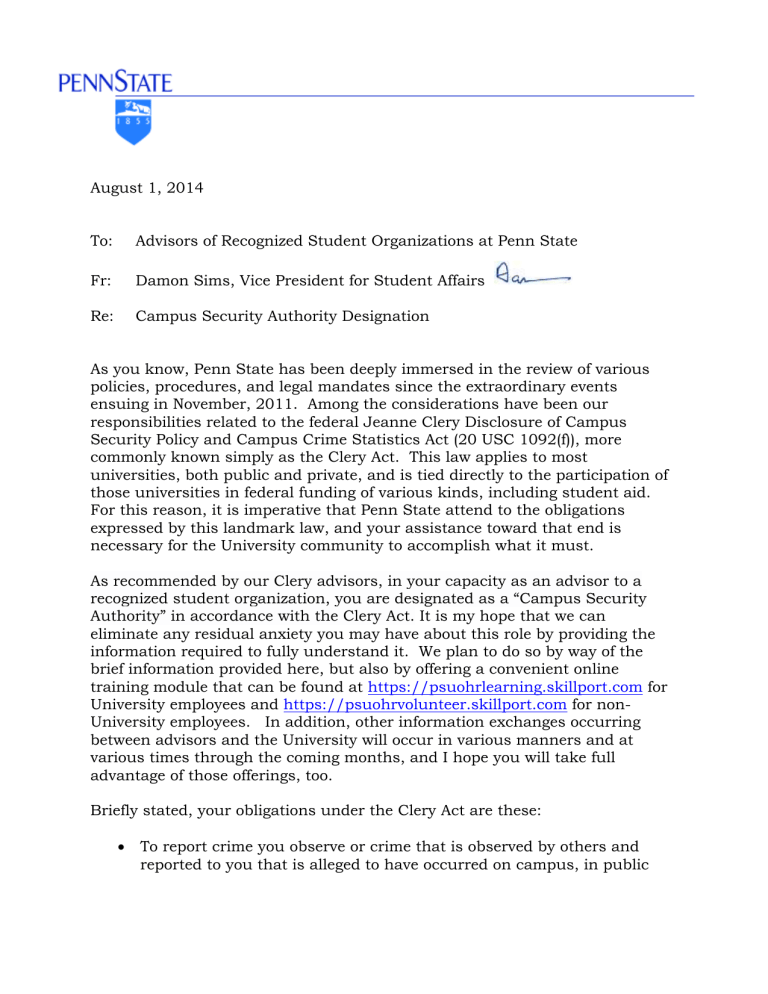
August 1, 2014
To: Advisors of Recognized Student Organizations at Penn State
Fr: Damon Sims, Vice President for Student Affairs
Re: Campus Security Authority Designation
As you know, Penn State has been deeply immersed in the review of various policies, procedures, and legal mandates since the extraordinary events ensuing in November, 2011. Among the considerations have been our responsibilities related to the federal Jeanne Clery Disclosure of Campus
Security Policy and Campus Crime Statistics Act (20 USC 1092(f)), more commonly known simply as the Clery Act. This law applies to most universities, both public and private, and is tied directly to the participation of those universities in federal funding of various kinds, including student aid.
For this reason, it is imperative that Penn State attend to the obligations expressed by this landmark law, and your assistance toward that end is necessary for the University community to accomplish what it must.
As recommended by our Clery advisors, in your capacity as an advisor to a recognized student organization, you are designated as a “Campus Security
Authority” in accordance with the Clery Act. It is my hope that we can eliminate any residual anxiety you may have about this role by providing the information required to fully understand it. We plan to do so by way of the brief information provided here, but also by offering a convenient online training module that can be found at https://psuohrlearning.skillport.com
for
University employees and https://psuohrvolunteer.skillport.com
for non-
University employees. In addition, other information exchanges occurring between advisors and the University will occur in various manners and at various times through the coming months, and I hope you will take full advantage of those offerings, too.
Briefly stated, your obligations under the Clery Act are these:
To report crime you observe or crime that is observed by others and reported to you that is alleged to have occurred on campus, in public
areas bordering the campus, or in designated off-campus buildings owned or controlled by the University.
To notify the University of alleged crime that is reported to you in good faith, meaning that there is a reasonable basis for believing that the information is neither rumor nor hearsay.
To pass along to the police or designated University officials crime reported to you in this manner without first attempting to determine whether a crime has indeed occurred or whether such crime fits a category expressed in the Clery Act.
In short, your role is to report to an appropriate party insight about possible crime occurring in certain locations that you glean in good faith. You should do so without trying to discern whether the crime fits the reporting categories found in the Clery Act. Even so, it would be best for you to know with which crimes the Clery Act is concerned. Here is a listing of those crimes:
Criminal homicide (murder and non-negligent manslaughter)
Sex offenses (both forcible and non-forcible)
Robbery
Aggravated assault
Burglary
Motor vehicle theft
Arson
Hate Crimes
Domestic Violence
Dating Violence
Stalking
It should be evident that Clery crimes are not the usual issues with which you deal in your capacity as a student organization advisor. Nor must you concern yourself with the somewhat specialized question of whether a reported activity would actually be construed as a reportable crime under the Clery Act. That determination is better left to the police and other authorities. For these reasons, we would expect that your involvement in reporting possible Clery Act crimes will be extremely limited.
Some advisors have expressed concern about their possible legal liability related to Clery Act compliance, and this concern should never be wholly discounted. Yet it is important to note that, in general, the University would indemnify a student organization advisor acting within the scope of his or her service as a campus security authority, in accordance with the University’s bylaws and applicable law.
All of us--University employees and volunteers serving the student interest at
Penn State--share a commitment to the safety and well-being of our community. Your contribution to the life of Penn State students is greatly appreciated, and we want to do nothing that would discourage your continued contribution as a student organization advisor. I hope that these insights, shared before the beginning of another school year, are helpful, and that other information we offer, including the online module, will provide you the tools necessary to address this legal obligation effectively and without worry. On behalf of Penn State, I thank you for all that you do, and please know that I will be eager to respond to any questions or concerns you may have.
Many thanks. cc: Roy Baker
Darcy Rameker
Danny Shaha
Bob Smith
Tommy Otterbine
